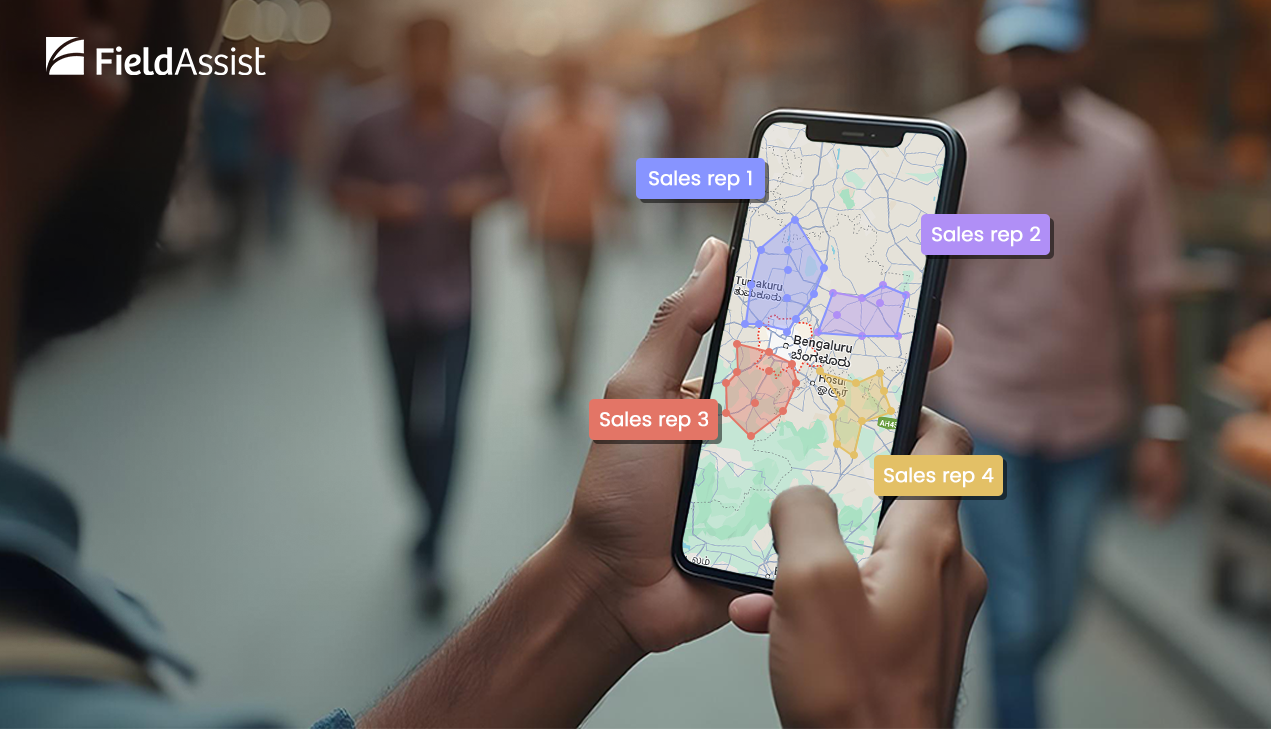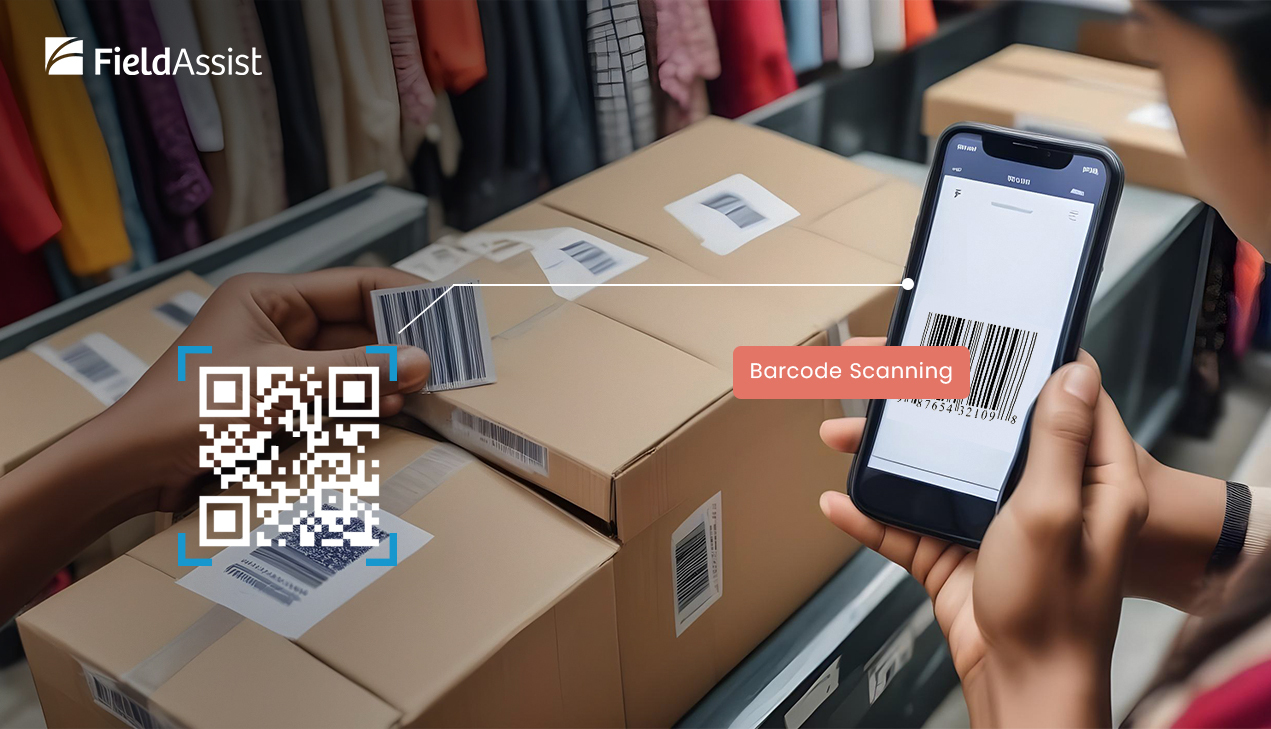Are your Channel Partners your biggest Brand Ambassadors?
You may be offering attractive promotions to your distributors but if they have a painful experience with your brand, they will never become your biggest fans.
Now strengthen distributor relationships with faster resolution on claims and improve the efficiency of your primary & secondary distribution channels. With our distributor management system.

Worth of claims settled monthly
0
Cr+
Deployments every month
0
+
Invoices processed daily
0
million+
Seamless inventory management. Automatic detection of low stocks. Automatic stock replenishment. Real-time stocking and ordering data.
Get a bird’s eye view and a granular view of where your products are coming and going.
Smart predictive alerts to avoid stockout situations at partners or distributor points.
Minimize product returns, and increase financial returns. Batch-level visibility over product aging. Automatic alerts for stock nearing expiry.
Sit back and watch your inventory restock itself. AI-powered Machine Learning system that predicts future demand based on past sales patterns, and places orders in the required quantities before stocks deplete. All fully automatic - just watch your shelves re-stock without any manual intervention.
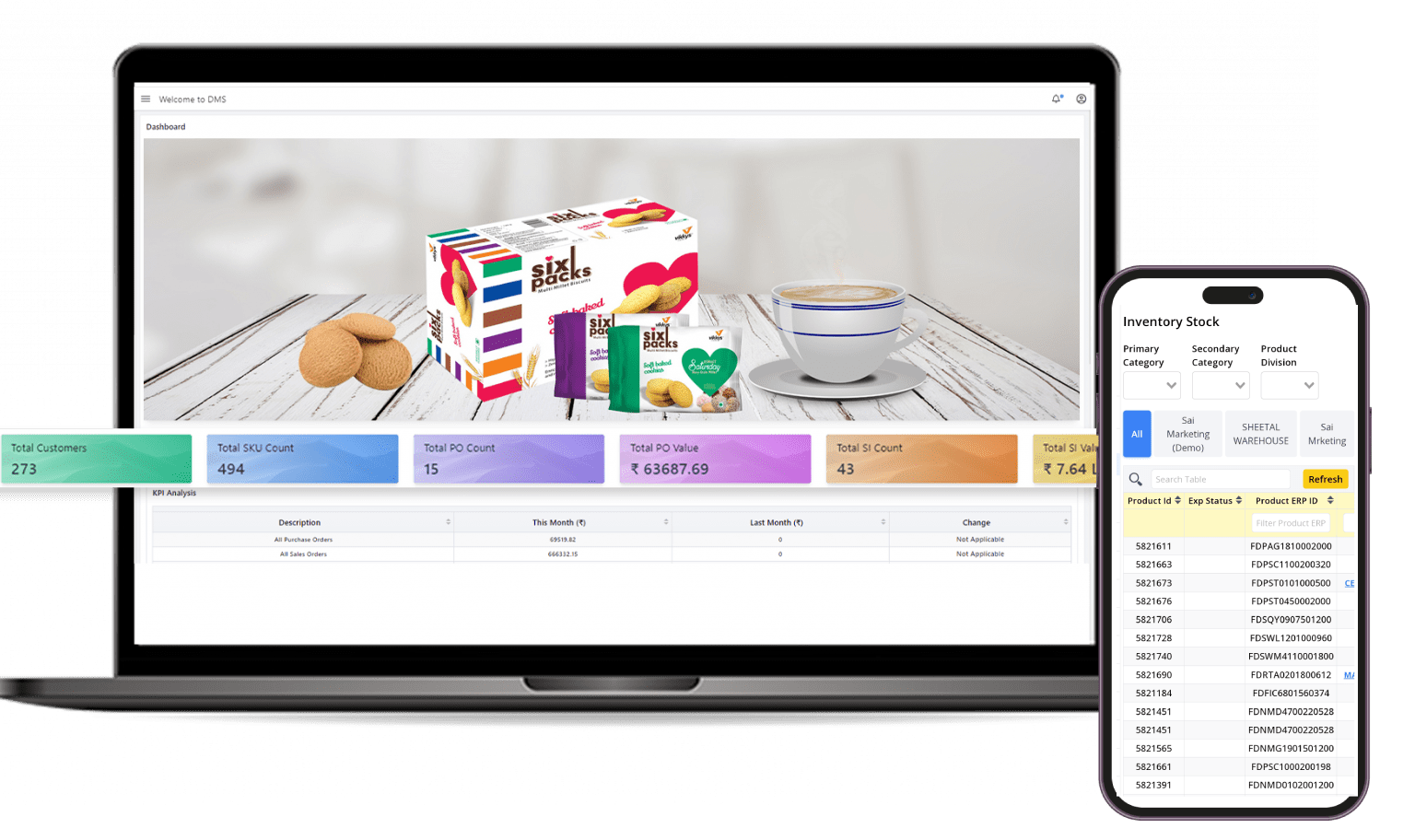
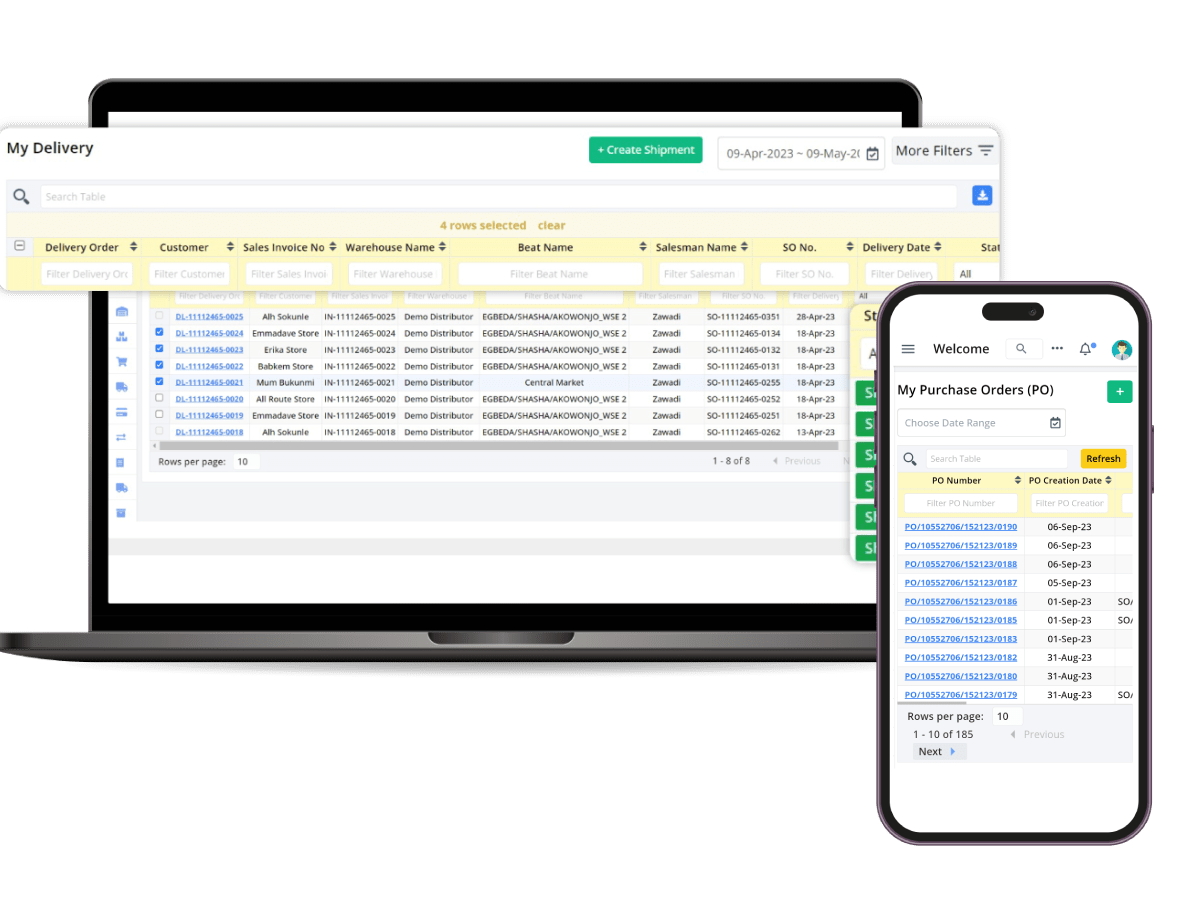
Faster Invoicing with Better Schemes and Promotions
Hassle-free delivery management and automatic scheme management. Bulk printings with loadsheets for faster deliveries. Make your own custom PDF invoice templates. Include barcodes and QR codes in invoices.
Track and manage accounting data with ease and simplicity. Generate reports and analytics based on desired criteria. Seamless integration with your accounting system. Auto reminder for pending payments.
Dedicated Trade Promotion Management module to manage promotions across platforms (SFA, DMS, Van Sales, Modern Trade and Retailer App). Manage, simulate, and configure schemes of all types with different slabs.
Fewer clicks, more results. Automated Workflows. Minimum manual work. All leading to better adoption.
Instant claims settlement
Keep cash flowing in distributors’ wallets. Faster claims settlements. A win-win for everyone, including your bank account.
Dedicated “Claim-Me” module for claims management and submission. Submit scheme, margin, DSR, or custom claims - all submitted in one click.
Genuine settlements. No chance of leakage or mismatch.
Auto posting of claims via robust integrations. Multi-level approval workflows. Automatic settlements of credit/debit notes back to distributors.
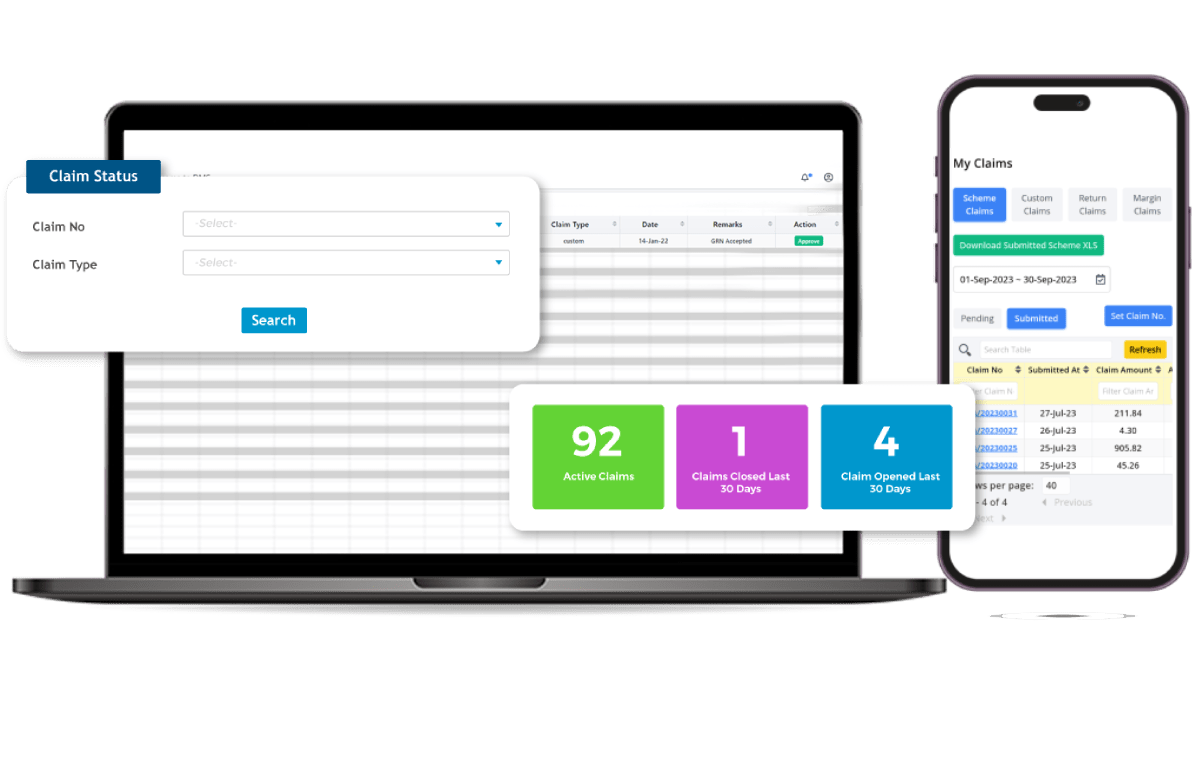
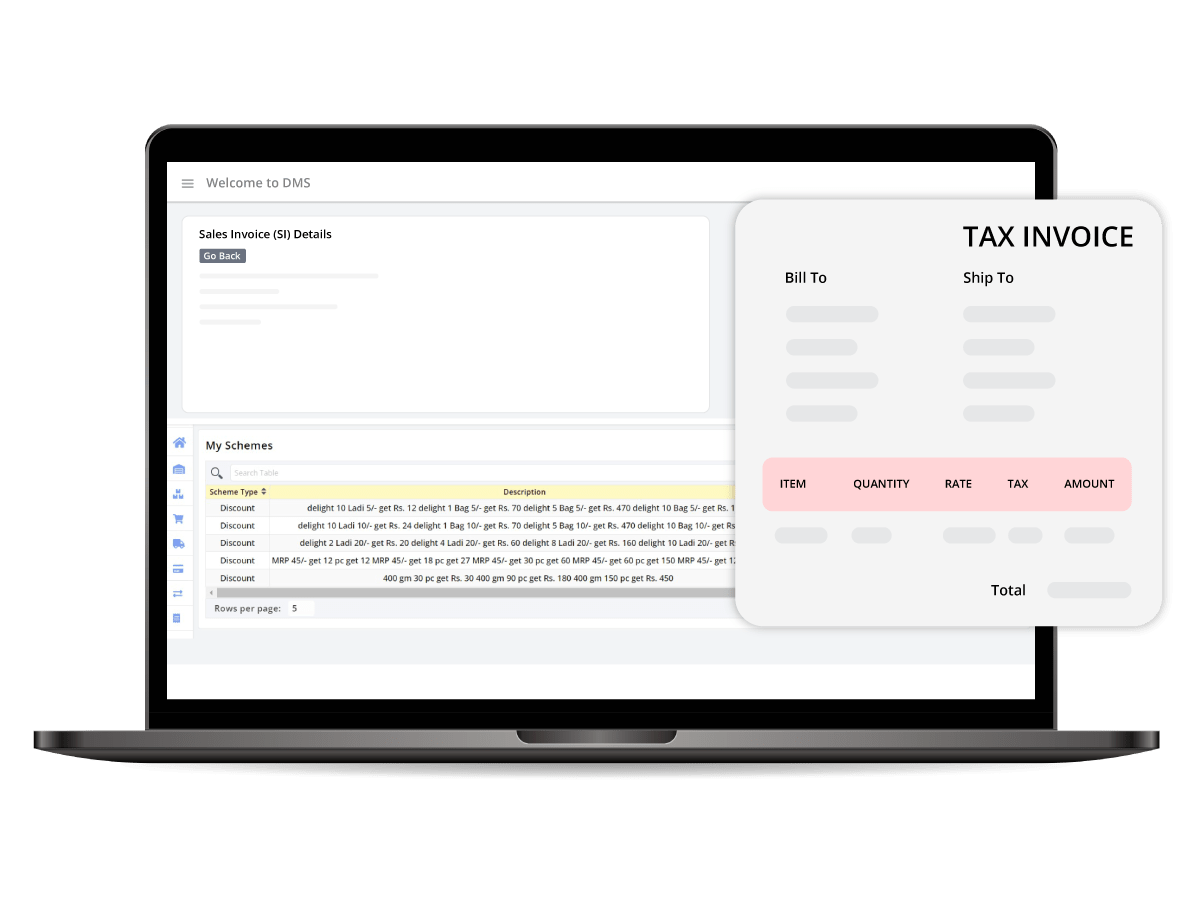
Easy Tax Compliance. Also automated, just like everything else
It’s all in-built and pre-configured. Never calculate anything manually again. Eliminate unnecessary paperwork.
Comply with all GST rules and invoice formats.
FieldAssist DMS can integrate with anyone, anywhere
FieldAssist DMS is specifically designed to be easily integrated and work with various other enterprise solutions.
with ERP and BI solutions, including SAP, Microsoft Dynamics, Oracle BI, Tally and many more.
available for custom integrations. All FieldAssist DMS functions and modules, such as invoices, orders, credit/debit notes, can be integrated in no time.
Comprehensive sample code, API documentation, expert consulting and technical support, sandboxed environments, live logs, and much more.
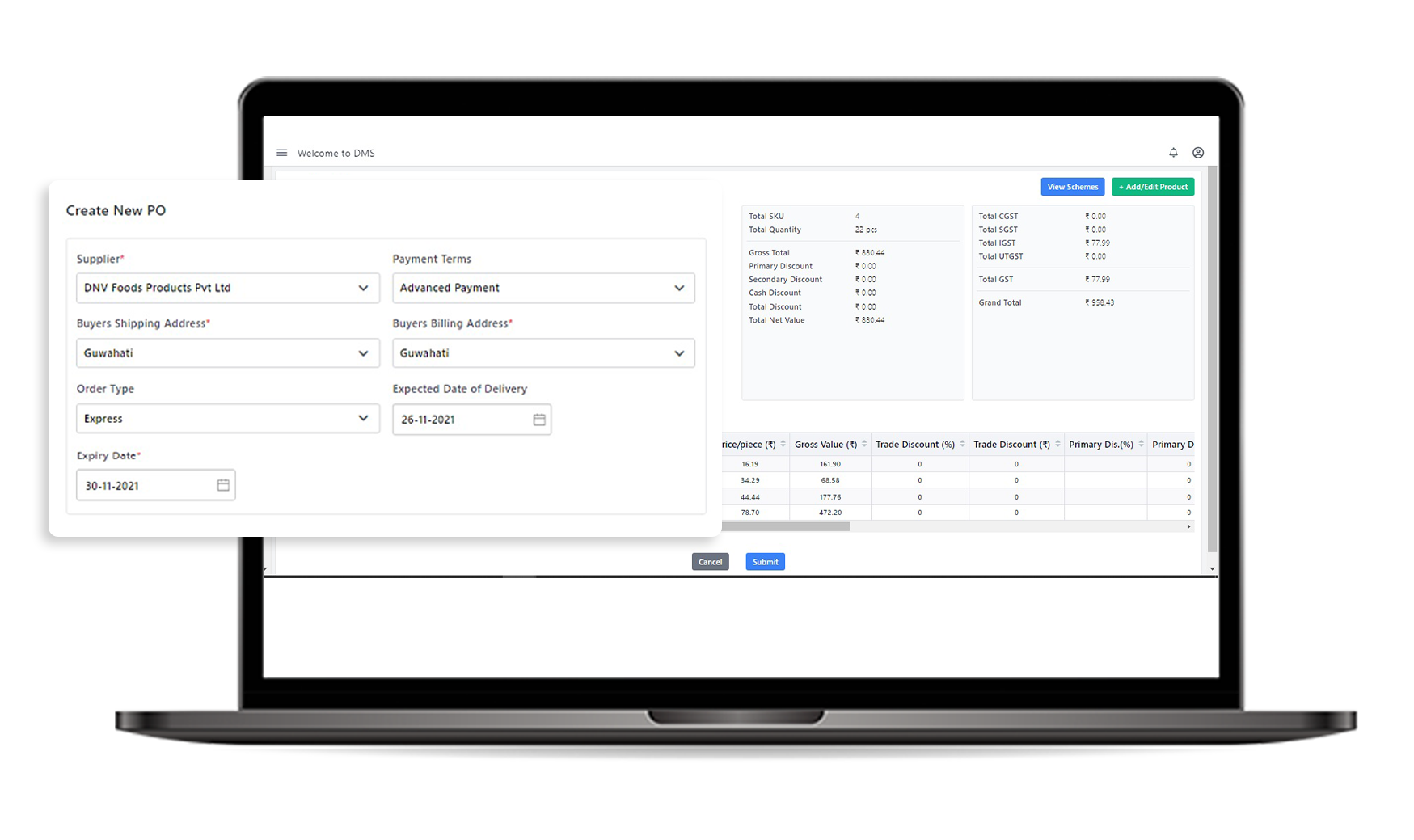
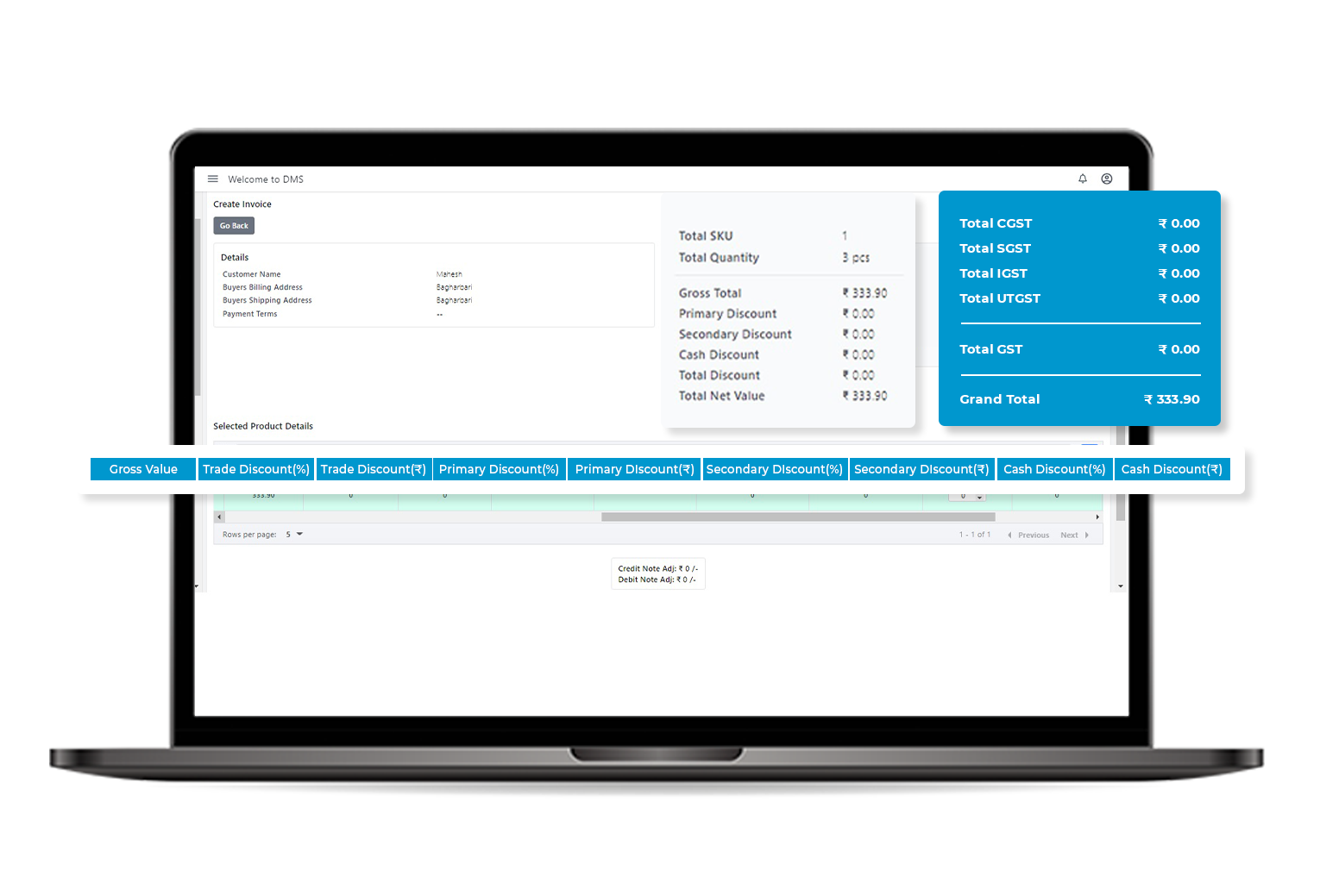
Future-proof and Future-ready: Building tomorrow’s features, today
Diverse and custom tailored financing options available for everyone in the supply chain, from stockists to distributors to retailers
Competitive interest rates compared to other options.
Talk to people who understand your specific line of work and your unique challenges, rather than generic loan salesmen.
Instant payment via UPI or wallets.
Customize your DMS workflows without writing a single line of code.
Customize the UI fields and labels as per your needs.
Orders can be booked on WhatsApp, which is fully integrated with FieldAssist DMS. No more waiting for sales agents.
End-to-end retailer loyalty management and settlement.
Powered with Microsoft Azure and best-in-class technology.
- Actionable insights provided with real-time integrated analytics, product movement, sales transactions, heat maps, and more.
Make Rural markets part of your digital revolution
Enable yourself to embrace the rural challenge with rural-ready DMS.
Enable rural sub-distributors to be part of your digital business transformation.
Full support for mobile platforms. Sales staff and rural distributors can update data in real time, on the go.
Plug leakages by automated inventory management via Load-out and Load-in.
Take full stock of van sales and returns.
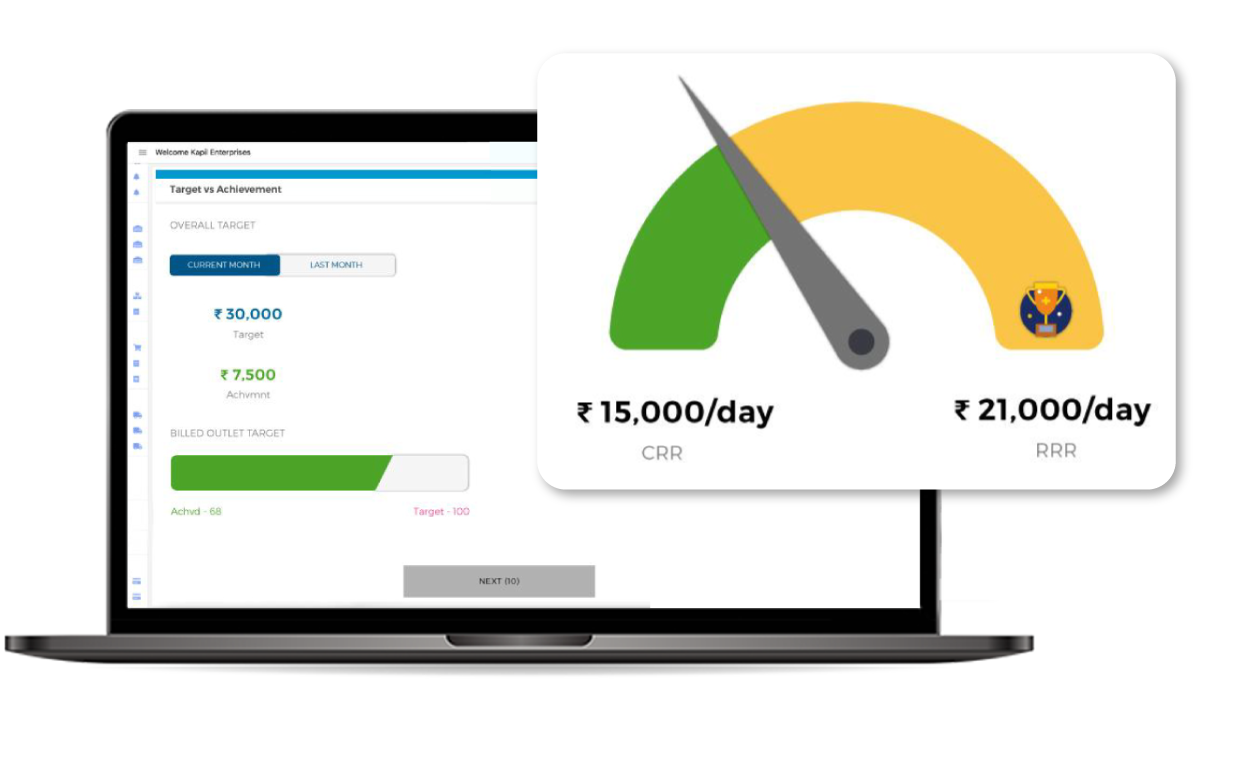
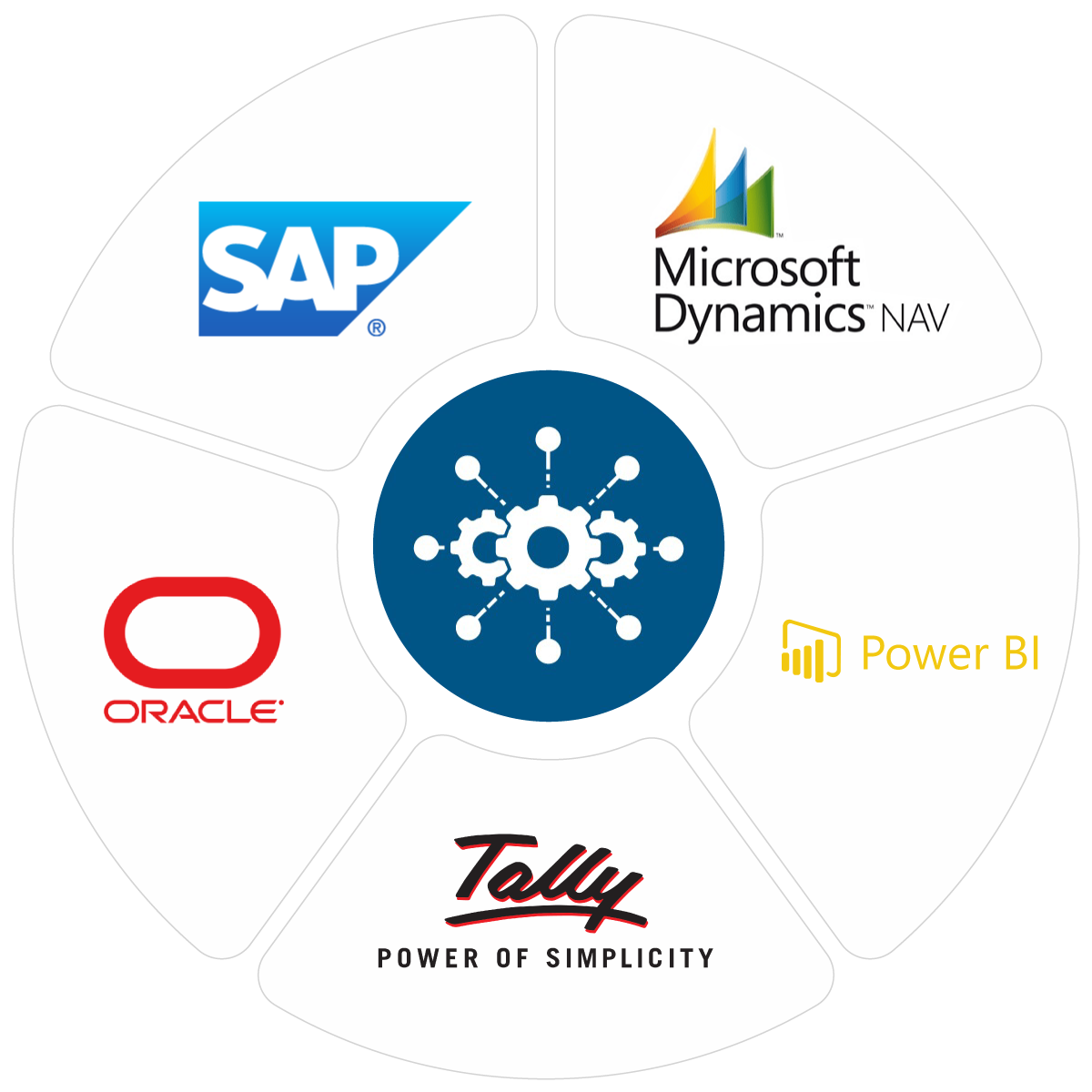
Implementations are a breeze
Gone are days when DMS implementations took months to start and years to end. Get FieldAssist Distributor Management System up and running on your channel partner locations within six weeks.
The technology changes for you, rather than the other way round. Our unique business-first approach tailors the DMS implementation and configurations to your specific business requirements, workflows, and user mental models.
We take joint responsibility with you for DMS adoption. We stand with you all the way, not just until enabling user login IDs. Get full assistance and user training, and solutions consulting for adoption.
FieldAssist Distributor Management System and all its features are available on Android and iOS platforms
Easily migrate your data from other platforms to FieldAssist DMS
About Distributor Management System

What is a Distributor Management System (DMS)?
A Distributor Management System (DMS) is a software that enables FMCG firms to manage and control their supply chain. A mobile and online DMS is a core pillar of supply chain automation and consumer and distributor management. A distributor management system helps with inventory management, claims management, schemes and promotions, invoicing, sales targets, retail data analytics and more.
A good distribution management software helps make the supply chain more efficient and streamlined, eliminate stockouts, obtain real-time sales data, and increase revenues.
The Need for a Distributor Management System (DMS)
The implementation of a mobile and online Distributor Management System (DMS) has become essential for Consumer Packaged Goods (CPG) brands. Here’s why:
- Effective Distributor Network Management:
- A distributor & consumer management system empowers CPG brands to efficiently manage and control their distributor network, ensuring streamlined operations.
- Example: An FMCG brand utilizes DMS to monitor distributor performance, streamline orders, and manage distributor relationships effectively.
- Real-time Market Activity Overview:
- With distributor & consumer management system, brands gain real-time visibility into market activities, including distributor sales, inventory levels, and order statuses.
- Example: A cosmetics brand tracks distributor sales and inventory in real time, allowing quick responses to market demand fluctuations.
- Data Analytics for Informed Decisions:
- DMS provides data analytics capabilities, enabling brands to make informed decisions based on sales and market activity data.
- Example: A healthcare company leverages DMS data analytics to identify market trends, optimizing product offerings and marketing strategies.
- Inventory Management Optimization:
- DMS helps in optimizing inventory management by providing insights into demand patterns and stock levels.
- Example: An electronics brand uses DMS to prevent overstocking and reduce carrying costs while ensuring product availability.
- Efficient Order Processing:
- Major supply chain activities, such as order processing, are automated through DMS, reducing errors and order fulfillment times.
- Example: A pharmaceutical company accelerates order processing with DMS, ensuring timely deliveries to pharmacies.
- Enhanced Communication:
- DMS fosters seamless communication between CPG brands and their distributors, reducing miscommunications and delays.
- Example: A food brand maintains effective communication with distributors, leading to improved order accuracy and delivery timelines.
A mobile and online Distributor Management System (DMS) is imperative for CPG brands to navigate the challenges of the market effectively. Real-world examples demonstrate how DMS solutions have transformed operations and decision-making processes for brands in industries such as FMCG, cosmetics, and healthcare.
Challenges DMS solves
Distribution Management Systems play a pivotal role in addressing various challenges faced by brands and companies. Here’s how DMS tackles these challenges with real-world examples:
- Lack of Real-time Visibility:
- With an online and mobile DMS, brands gain a comprehensive 360° view of market and distributor activity in real time.
- Example: An FMCG company can track distributor orders, inventory levels, and sales data instantly, allowing for rapid response to market changes.
- Manual Data Management:
- DMS automates almost all major supply chain activities, reducing the reliance on manual data entry and minimizing errors.
- Example: A medical equipment distributor streamlines order processing, eliminating data entry errors, and ensuring accurate order fulfillment.
- Inventory Optimization:
- DMS provides insights into demand patterns and stock levels, assisting in optimizing inventory management.
- Example: A distributor of consumer electronics leverages DMS to avoid overstocking and reduce carrying costs significantly.
- Inefficient Route Planning:
- DMS optimizes delivery routes, reducing fuel costs, and enhancing overall delivery efficiency.
- Example: A food distribution company achieves substantial fuel cost savings by utilizing DMS for route optimization.
- Data-Driven Decision-Making:
- DMS offers valuable data analytics capabilities, empowering brands to make informed, strategic decisions.
- Example: A cosmetics distributor leverages distributor & consumer management system data to identify top-performing products and tailor marketing efforts accordingly
- Accurate Demand Forecasting:
- DMS utilizes historical data and predictive analytics to improve demand forecasting accuracy.
- Example: An automotive parts distributor achieves precise demand forecasting, leading to reduced excess inventory and minimized stockouts.
- Compliance and Traceability:
- DMS ensures compliance with regulations and provides robust traceability in case of product recalls.
- Example: A pharmaceutical distributor easily maintains compliance with FDA regulations by tracking product origins through their DMS.
- Streamlined Communication:
- DMS fosters seamless communication between brands and distributors, reducing miscommunications and delays.
- Example: A clothing brand maintains effective communication with distributors, leading to improved order accuracy and delivery timelines.
Benefits of Distribution Management System (DMS)
Distribution Management System (DMS) offers tangible benefits to various industries, from FMCG to pharmaceuticals, by optimizing operations, enhancing customer satisfaction, and facilitating data-driven decision-making. Real-world examples illustrate how DMS can be a game-changer in distributor management.
- Improved Inventory Management:
- A distributor & consumer management system helps optimize stock levels by providing real-time insights into inventory levels and demand patterns
- Example: A distributor of electronic gadgets uses DMS to track the popularity of different products, reducing overstock and stockouts.
- Enhanced Order Processing:
- DMS streamlines order processing, reducing manual errors and order fulfillment times.
- Example: A pharmaceutical distributor accelerates order processing, ensuring timely delivery to pharmacies, enhancing customer satisfaction.
- Efficient Route Planning:
- DMS optimizes delivery routes, reducing fuel costs and improving delivery times.
- Example: A food distributor uses DMS to plan routes, resulting in a 20% reduction in fuel expenses and faster deliveries.
- Data-Driven Decision-Making:
- DMS provides valuable data analytics, aiding in strategic decisions.
- Example: An FMCG company leverages DMS data to identify emerging market trends and adjust product offerings accordingly.
- Enhanced Supplier Collaboration:
- DMS enables better communication and collaboration with suppliers, ensuring a smooth supply chain.
- Example: A retailer collaborates seamlessly with suppliers through a DMS portal, reducing lead times and out-of-stock situations.
- Accurate Demand Forecasting:
- DMS utilizes historical data and predictive analytics to improve demand forecasting accuracy.
- Example: A clothing distributor leverages DMS to forecast demand for seasonal items, minimizing excess inventory.
- Compliance and Traceability:
- DMS helps ensure compliance with regulatory requirements and provides traceability in case of product recalls.
- Example: A pharmaceutical company uses DMS to track and trace the origin of every batch, meeting stringent FDA regulations.
- Customer Relationship Management:
- DMS aids in managing customer data, preferences, and interactions, leading to personalized customer experiences.
- Example: A distributor of luxury goods uses DMS to provide tailored recommendations to high-value customers.
- Cost Reduction:
- DMS reduces operational costs by automating manual processes and optimizing resource allocation.
- Example: A beverage distributor lowers operational costs by 15% through the implementation of DMS.
- Scalability:
- DMS allows businesses to scale their distribution operations efficiently without significant IT investments.
- Example: A startup in the e-commerce sector quickly expands its distribution network with a cloud-based DMS.
The FieldAssist Difference
FieldAssist provides real-time sales figures and data analytics for your market activity and distributor network. With full mobile support, everything from KPIs to daily transactions is visible at your fingertips. From best-in-class customizations to integration-friendliness, FieldAssist DMS provides you with the most comprehensive feature set to automate your supply chain.
About Distributor Management System
What is a Distributor Management System (DMS)?
The Need for a Distributor Management System (DMS)
Challenges DMS solves
Benefits of Distribution Management System (DMS)
The FieldAssist Difference
What is a Distributor Management System (DMS)?
A Distributor Management System (DMS) is a software that enables FMCG firms to manage and control their supply chain. A mobile and online DMS is a core pillar of supply chain automation and consumer and distributor management. A distributor management system helps with inventory management, claims management, schemes and promotions, invoicing, sales targets, retail data analytics and more.
A good distribution management software helps make the supply chain more efficient and streamlined, eliminate stockouts, obtain real-time sales data, and increase revenues.
The Need for a Distributor Management System (DMS)
The implementation of a mobile and online Distributor Management System (DMS) has become essential for Consumer Packaged Goods (CPG) brands. Here’s why:
- Effective Distributor Network Management:
- A distributor & consumer management system empowers CPG brands to efficiently manage and control their distributor network, ensuring streamlined operations.
- Example: An FMCG brand utilizes DMS to monitor distributor performance, streamline orders, and manage distributor relationships effectively.
- Real-time Market Activity Overview:
- With distributor & consumer management system, brands gain real-time visibility into market activities, including distributor sales, inventory levels, and order statuses.
- Example: A cosmetics brand tracks distributor sales and inventory in real time, allowing quick responses to market demand fluctuations.
- Data Analytics for Informed Decisions:
- DMS provides data analytics capabilities, enabling brands to make informed decisions based on sales and market activity data.
- Example: A healthcare company leverages DMS data analytics to identify market trends, optimizing product offerings and marketing strategies.
- Inventory Management Optimization:
- DMS helps in optimizing inventory management by providing insights into demand patterns and stock levels.
- Example: An electronics brand uses DMS to prevent overstocking and reduce carrying costs while ensuring product availability.
- Efficient Order Processing:
- Major supply chain activities, such as order processing, are automated through DMS, reducing errors and order fulfillment times.
- Example: A pharmaceutical company accelerates order processing with DMS, ensuring timely deliveries to pharmacies.
- Enhanced Communication:
- DMS fosters seamless communication between CPG brands and their distributors, reducing miscommunications and delays.
- Example: A food brand maintains effective communication with distributors, leading to improved order accuracy and delivery timelines.
A mobile and online Distributor Management System (DMS) is imperative for CPG brands to navigate the challenges of the market effectively. Real-world examples demonstrate how DMS solutions have transformed operations and decision-making processes for brands in industries such as FMCG, cosmetics, and healthcare.
- A distributor & consumer management system empowers CPG brands to efficiently manage and control their distributor network, ensuring streamlined operations.
- Example: An FMCG brand utilizes DMS to monitor distributor performance, streamline orders, and manage distributor relationships effectively.
- With distributor & consumer management system, brands gain real-time visibility into market activities, including distributor sales, inventory levels, and order statuses.
- Example: A cosmetics brand tracks distributor sales and inventory in real time, allowing quick responses to market demand fluctuations.
- DMS provides data analytics capabilities, enabling brands to make informed decisions based on sales and market activity data.
- Example: A healthcare company leverages DMS data analytics to identify market trends, optimizing product offerings and marketing strategies.
- DMS helps in optimizing inventory management by providing insights into demand patterns and stock levels.
- Example: An electronics brand uses DMS to prevent overstocking and reduce carrying costs while ensuring product availability.
- Major supply chain activities, such as order processing, are automated through DMS, reducing errors and order fulfillment times.
- Example: A pharmaceutical company accelerates order processing with DMS, ensuring timely deliveries to pharmacies.
- DMS fosters seamless communication between CPG brands and their distributors, reducing miscommunications and delays.
- Example: A food brand maintains effective communication with distributors, leading to improved order accuracy and delivery timelines.
Challenges DMS solves
Distribution Management Systems play a pivotal role in addressing various challenges faced by brands and companies. Here’s how DMS tackles these challenges with real-world examples:
- Lack of Real-time Visibility:
- With an online and mobile DMS, brands gain a comprehensive 360° view of market and distributor activity in real time.
- Example: An FMCG company can track distributor orders, inventory levels, and sales data instantly, allowing for rapid response to market changes.
- Manual Data Management:
- DMS automates almost all major supply chain activities, reducing the reliance on manual data entry and minimizing errors.
- Example: A medical equipment distributor streamlines order processing, eliminating data entry errors, and ensuring accurate order fulfillment.
- Inventory Optimization:
- DMS provides insights into demand patterns and stock levels, assisting in optimizing inventory management.
- Example: A distributor of consumer electronics leverages DMS to avoid overstocking and reduce carrying costs significantly.
- Inefficient Route Planning:
- DMS optimizes delivery routes, reducing fuel costs, and enhancing overall delivery efficiency.
- Example: A food distribution company achieves substantial fuel cost savings by utilizing DMS for route optimization.
- Data-Driven Decision-Making:
- DMS offers valuable data analytics capabilities, empowering brands to make informed, strategic decisions.
- Example: A cosmetics distributor leverages distributor & consumer management system data to identify top-performing products and tailor marketing efforts accordingly
- Accurate Demand Forecasting:
- DMS utilizes historical data and predictive analytics to improve demand forecasting accuracy.
- Example: An automotive parts distributor achieves precise demand forecasting, leading to reduced excess inventory and minimized stockouts.
- Compliance and Traceability:
- DMS ensures compliance with regulations and provides robust traceability in case of product recalls.
- Example: A pharmaceutical distributor easily maintains compliance with FDA regulations by tracking product origins through their DMS.
- Streamlined Communication:
- DMS fosters seamless communication between brands and distributors, reducing miscommunications and delays.
- Example: A clothing brand maintains effective communication with distributors, leading to improved order accuracy and delivery timelines.
- With an online and mobile DMS, brands gain a comprehensive 360° view of market and distributor activity in real time.
- Example: An FMCG company can track distributor orders, inventory levels, and sales data instantly, allowing for rapid response to market changes.
- DMS automates almost all major supply chain activities, reducing the reliance on manual data entry and minimizing errors.
- Example: A medical equipment distributor streamlines order processing, eliminating data entry errors, and ensuring accurate order fulfillment.
- DMS provides insights into demand patterns and stock levels, assisting in optimizing inventory management.
- Example: A distributor of consumer electronics leverages DMS to avoid overstocking and reduce carrying costs significantly.
- DMS optimizes delivery routes, reducing fuel costs, and enhancing overall delivery efficiency.
- Example: A food distribution company achieves substantial fuel cost savings by utilizing DMS for route optimization.
- DMS offers valuable data analytics capabilities, empowering brands to make informed, strategic decisions.
- Example: A cosmetics distributor leverages distributor & consumer management system data to identify top-performing products and tailor marketing efforts accordingly
- DMS utilizes historical data and predictive analytics to improve demand forecasting accuracy.
- Example: An automotive parts distributor achieves precise demand forecasting, leading to reduced excess inventory and minimized stockouts.
- DMS ensures compliance with regulations and provides robust traceability in case of product recalls.
- Example: A pharmaceutical distributor easily maintains compliance with FDA regulations by tracking product origins through their DMS.
- DMS fosters seamless communication between brands and distributors, reducing miscommunications and delays.
- Example: A clothing brand maintains effective communication with distributors, leading to improved order accuracy and delivery timelines.
Benefits of Distribution Management System (DMS)
Distribution Management System (DMS) offers tangible benefits to various industries, from FMCG to pharmaceuticals, by optimizing operations, enhancing customer satisfaction, and facilitating data-driven decision-making. Real-world examples illustrate how DMS can be a game-changer in distributor management.
- Improved Inventory Management:
- A distributor & consumer management system helps optimize stock levels by providing real-time insights into inventory levels and demand patterns
- Example: A distributor of electronic gadgets uses DMS to track the popularity of different products, reducing overstock and stockouts.
- Enhanced Order Processing:
- DMS streamlines order processing, reducing manual errors and order fulfillment times.
- Example: A pharmaceutical distributor accelerates order processing, ensuring timely delivery to pharmacies, enhancing customer satisfaction.
- Efficient Route Planning:
- DMS optimizes delivery routes, reducing fuel costs and improving delivery times.
- Example: A food distributor uses DMS to plan routes, resulting in a 20% reduction in fuel expenses and faster deliveries.
- Data-Driven Decision-Making:
- DMS provides valuable data analytics, aiding in strategic decisions.
- Example: An FMCG company leverages DMS data to identify emerging market trends and adjust product offerings accordingly.
- Enhanced Supplier Collaboration:
- DMS enables better communication and collaboration with suppliers, ensuring a smooth supply chain.
- Example: A retailer collaborates seamlessly with suppliers through a DMS portal, reducing lead times and out-of-stock situations.
- Accurate Demand Forecasting:
- DMS utilizes historical data and predictive analytics to improve demand forecasting accuracy.
- Example: A clothing distributor leverages DMS to forecast demand for seasonal items, minimizing excess inventory.
- Compliance and Traceability:
- DMS helps ensure compliance with regulatory requirements and provides traceability in case of product recalls.
- Example: A pharmaceutical company uses DMS to track and trace the origin of every batch, meeting stringent FDA regulations.
- Customer Relationship Management:
- DMS aids in managing customer data, preferences, and interactions, leading to personalized customer experiences.
- Example: A distributor of luxury goods uses DMS to provide tailored recommendations to high-value customers.
- Cost Reduction:
- DMS reduces operational costs by automating manual processes and optimizing resource allocation.
- Example: A beverage distributor lowers operational costs by 15% through the implementation of DMS.
- Scalability:
- DMS allows businesses to scale their distribution operations efficiently without significant IT investments.
- Example: A startup in the e-commerce sector quickly expands its distribution network with a cloud-based DMS.
- A distributor & consumer management system helps optimize stock levels by providing real-time insights into inventory levels and demand patterns
- Example: A distributor of electronic gadgets uses DMS to track the popularity of different products, reducing overstock and stockouts.
- DMS streamlines order processing, reducing manual errors and order fulfillment times.
- Example: A pharmaceutical distributor accelerates order processing, ensuring timely delivery to pharmacies, enhancing customer satisfaction.
- DMS optimizes delivery routes, reducing fuel costs and improving delivery times.
- Example: A food distributor uses DMS to plan routes, resulting in a 20% reduction in fuel expenses and faster deliveries.
- DMS provides valuable data analytics, aiding in strategic decisions.
- Example: An FMCG company leverages DMS data to identify emerging market trends and adjust product offerings accordingly.
- DMS enables better communication and collaboration with suppliers, ensuring a smooth supply chain.
- Example: A retailer collaborates seamlessly with suppliers through a DMS portal, reducing lead times and out-of-stock situations.
- DMS utilizes historical data and predictive analytics to improve demand forecasting accuracy.
- Example: A clothing distributor leverages DMS to forecast demand for seasonal items, minimizing excess inventory.
- DMS helps ensure compliance with regulatory requirements and provides traceability in case of product recalls.
- Example: A pharmaceutical company uses DMS to track and trace the origin of every batch, meeting stringent FDA regulations.
- DMS aids in managing customer data, preferences, and interactions, leading to personalized customer experiences.
- Example: A distributor of luxury goods uses DMS to provide tailored recommendations to high-value customers.
- DMS reduces operational costs by automating manual processes and optimizing resource allocation.
- Example: A beverage distributor lowers operational costs by 15% through the implementation of DMS.
- DMS allows businesses to scale their distribution operations efficiently without significant IT investments.
- Example: A startup in the e-commerce sector quickly expands its distribution network with a cloud-based DMS.
The FieldAssist Difference
FieldAssist provides real-time sales figures and data analytics for your market activity and distributor network. With full mobile support, everything from KPIs to daily transactions is visible at your fingertips. From best-in-class customizations to integration-friendliness, FieldAssist DMS provides you with the most comprehensive feature set to automate your supply chain.
Frequently Asked Questions (FAQs)
A Distributor Management Software or DMS is a software that helps CPG brands manage and control their distributor and their activities and automate their supply chains. It also helps in invoicing, managing inventory, avoiding stockouts, obtaining real-time sales data, and much more.
The four types of distribution management are General Trade (GT), Modern Trade (MT), DIrect to Consumer (D2C), and E-commerce. GT is the traditional kirana stores and local shops and MT represents the supermarkets and large retailers. The newer D2C and E-commerce modes seek to benefit from the digital revolution and widespread broadband access to reach consumers directly. They are differentiated by expensive data gathering and market research. For a large FMCG company today, all four modes of distribution planning and management have their own importance and value. FieldAssist enables brands to make accurate decisions regarding their route-to-market strategy with the use of real-time statistics and birds-eye visibility over sales.
FieldAssist is an example of a Distributor Management System that empowers FMCG brands to take control of their supply chains and distributor network. It provides real-time visibility into sales and market activity, best-in-class features, full mobile support, and integration with other solutions in the technology stack.
A typical FMCG distributor network and structure typically consists of stockists, distributors, retailers and eventually consumers. Products are shipped from factories and company warehouses to stockists (sometimes super-stockists are also involved as an intermediate layer), who then send the products to the distributors under them as per demand, who in turn send them to retailers such as supermarkets and kirana stores, from where consumers eventually purchase them.
Success Stories
Trusted by 600+ Brands

How This Personal Care Brand is Gearing Up for 4X Growth
Ashish Mishra
Senior VP, Mamaearth
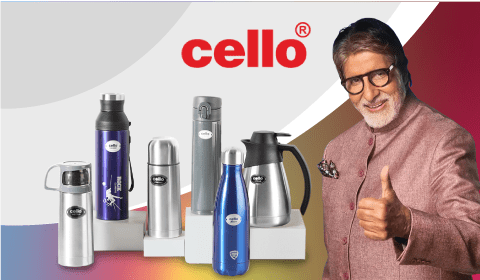
279%↑in outlets in 6 months? Cello cracks the code with a tech-powered GTM
Gaurav Rathod
MD, Cello
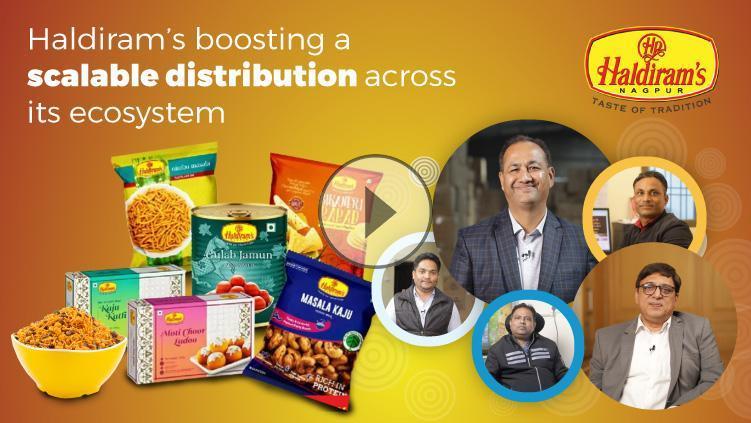
Haldiram's boosting a scalable distribution across its ecosystem with FieldAssist
Sanjay Munshi
Vice President, Haldiram

Lotus Herbals Glows Up its Retail Business With An Integrated Tech Platform
Nitin Passi
CMD, Lotus Herbals





